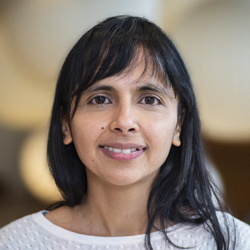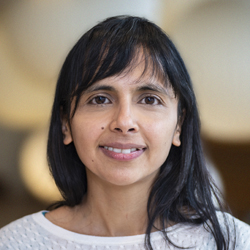Mridu Acharya, PhD

- Research Title: Principal Investigator
- Research Center: Center for Immunity and Immunotherapies
-
Biography
I am a principal investigator at SCRI, CIIT. I received my PhD from University of Glasgow, Scotland, UK, in 2008 and then moved to Massachusetts General Hospital/Harvard Medical School for post-doctoral training. In December 2013, I moved to Benaroya Research Institute, Seattle as a Staff Scientist and subsequently became Assistant Member in October 2016 and moved to SCRI on Oct 2018.
Research Description
Antigen binding to immune cells activates a complex network of receptors depending on the type of the antigen and other micro-environmental signals. These initial interactions determine the type of immune response that is subsequently generated. My research interest is in understanding how signals from different types of immune receptors and cytoskeletal molecules are integrated to produce an immune response tailored to the type of antigen encountered. B-lymphocytes provide an excellent model to study these kinds of signals because their stages of development and functional specialization during various types of immune responses have been well illustrated. Understanding how these early mechanistic events regulate recognition and processing of antigens would allow us to develop novel strategies to enhance B cell activation to antigens in vaccines, while preventing activation by self-antigens during autoimmunity.
Currently we are using a combination of cell biology, mouse models, human immunology and gene-editing to study how B-lymphocytes integrate signals from antigens and their environment to produce effective responses to pathogens while maintaining tolerance to self-derived antigens.
Expansion of antigen-specific B cells during immune response to viruses
We are investigating how novel proteins and pathways such as integrin signaling and autophagy proteins impact expansion of germinal center B cells, memory B cells, long-lived plasma cells and affinity maturation of antibodies during immune response to influenza virus.
Molecular mechanisms of intracellular trafficking during B cell activation
We are using a combination of microscopy, biochemistry and gene editing techniques to understand signaling and intracellular trafficking of: (a) cytoskeletal receptors such as integrins, (b) immune receptors such as B cell receptor , toll-like receptors and (c) molecules such as kinases and autophagy proteins during B cell stimulation by various types of ligands and antigens.
B cell activation during human autoimmune diseases
In collaboration with researchers at Benaroya Research Institute, using bio-repository human samples we are studying B cell activation during SLE to identify early events that lead to activation of self-reactive B cells during autoimmune diseases. Similarly using these samples, we are also studying the role of genetic variants in cytoskeletal proteins and autophagy pathway to identify novel targets that can modify B cell activation during autoimmune diseases.
Research Focus Area
Autoimmunity, Vaccines
-
Related Resources
-
The Acharya lab studies how immune cells integrate signals from pathogens and their environment to produce effective immunity against pathogens while maintaining tolerance to self-derived antigens.
-
-
Patient Testimonials
-
Awards and Honors
Loading...Award Name Award Description Awarded By Award Date {{ award.name }} {{ award.description }} {{ award.organization }} {{ award.displayDate }} No Awards and Honors found for Mridu Acharya, PhD
-
Publications
Loading...No Publications found for Mridu Acharya, PhD
-
Presentations
Loading...Presentation Title Event Location Date {{ presentation.title }} {{ presentation.presentedAt }} {{ presentation.location }} {{ presentation.displayDate }} No Presentations found for Mridu Acharya, PhD
-
Research Funding
Loading...Grant Title Grantor Amount Award Date {{ funding.title }} {{ funding.grantedBy }} {{ funding.amount }} {{ funding.displayDate }} No Research Funding found for Mridu Acharya, PhD
-
Clinical Trials and Research
Loading...{{ item.st }}
No clinical trials found for Mridu Acharya, PhD.
